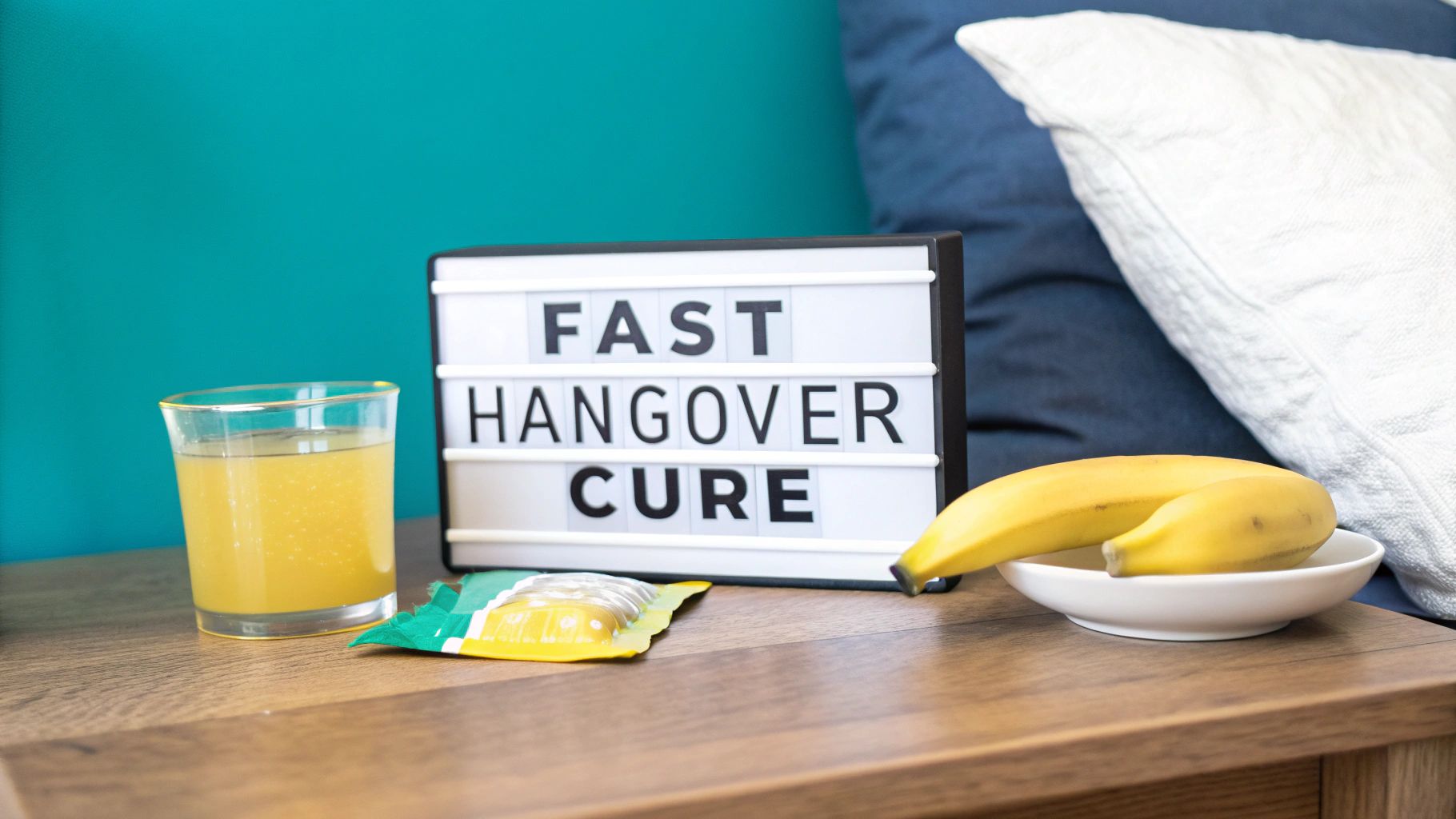

· By Annemarie
Cure a Hangover Fast with Science-Backed Tips
When you want to cure a hangover fast, you have to get proactive the second you wake up. The game plan is simple: tackle the dehydration and nutrient loss head-on.
This means drinking something loaded with electrolytes, eating a small, easy-on-the-stomach meal (think complex carbs), and then getting as much real rest as you can. I’ve found this three-pronged approach is the only reliable way to start feeling human again within a few hours.
Your Action Plan for Rapid Hangover Recovery
Waking up with a pounding headache and a churning stomach is your body sending out an S.O.S. The only way to answer that call is with a smart, immediate strategy—not by chugging a gallon of plain water or relying on old myths.
Your morning-after mission should be built on three core pillars:
- Intelligent rehydration
- Strategic nutrition
- Non-negotiable rest
This isn’t just about putting water back in your system; it's about giving your body exactly what it lost while processing alcohol. The visual below breaks down the simple but vicious cycle that causes a hangover and how a targeted recovery plan reverses that damage.
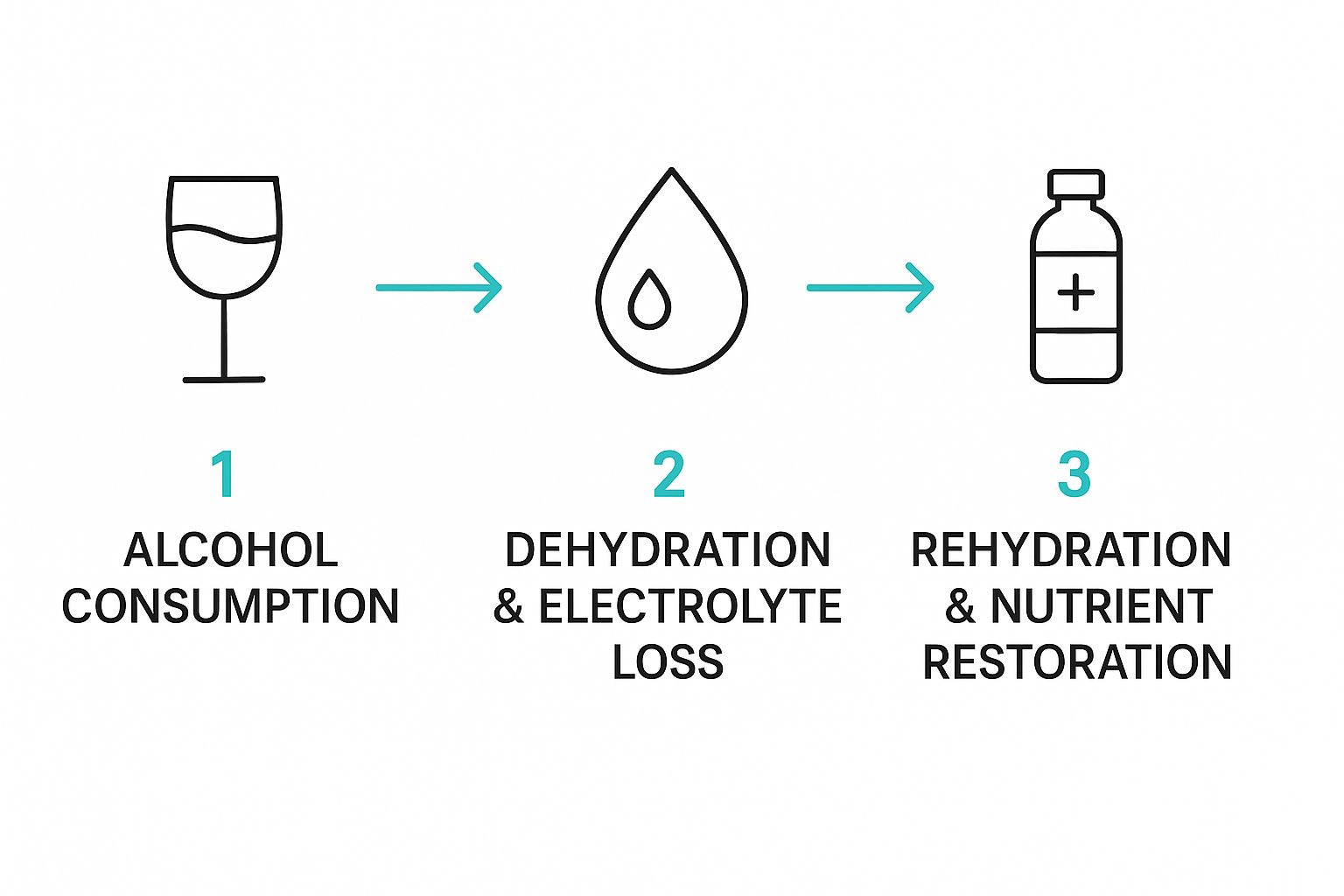
As you can see, recovery isn't a passive process of waiting it out. It's about actively replenishing the specific electrolytes and nutrients that alcohol strips away.
Immediate Hangover Recovery Checklist
Your first few moves after waking up are the most important. The moment your eyes open, your focus should be on stabilizing your system and kickstarting the healing process without making things worse.
Key Insight: A hangover isn’t just one thing. It's a perfect storm of issues—dehydration, inflammation, and blood sugar crashes. A fast cure means you have to fight all three at once.
This is a really common mistake. People think, "I'm just dehydrated," but it's so much more than that. Think of it as a system-wide meltdown that needs a multi-front attack. A sports drink can help with dehydration, a banana tackles lost potassium and low blood sugar, and a nap deals with the exhaustion from poor-quality, alcohol-wrecked sleep.
To make this crystal clear, here’s a quick-glance table of what you should be doing right away.
Immediate Hangover Recovery Checklist
| Action | Why It Works | Real-World Example |
|---|---|---|
| Hydrate with Electrolytes | Replaces vital minerals like sodium and potassium that alcohol flushes out, which are critical for nerve and muscle function. | Drinking a coconut water, an electrolyte packet mixed in water, or an Upside Hangover Jelly before plain water. |
| Eat a Gentle Meal | Stabilizes crashing blood sugar levels and provides easy-to-digest energy without upsetting your stomach further. | A piece of whole-wheat toast with a little avocado, a small bowl of oatmeal, or a banana. |
| Get More Rest | Alcohol disrupts deep sleep, so your body needs extra time to physically and mentally repair itself. | Going back to sleep for 90 minutes, or at least lying down in a dark, quiet room if you can't fall back asleep. |
This understanding is exactly why the hangover relief market is exploding. It was valued at around USD 2.2 billion in 2023 and is projected to hit USD 7.7 billion by 2032. This isn’t just a fad; it reflects a growing awareness that targeted solutions actually work way better than just toughing it out. You can dive into the complete market analysis to see the data behind this trend.
Your goal right now is simple: give your body the tools it needs to repair itself. Stick to these gentle, effective first steps, and you’ll be on the fast track to turning your day around.
Rehydrating Smarter, Not Harder
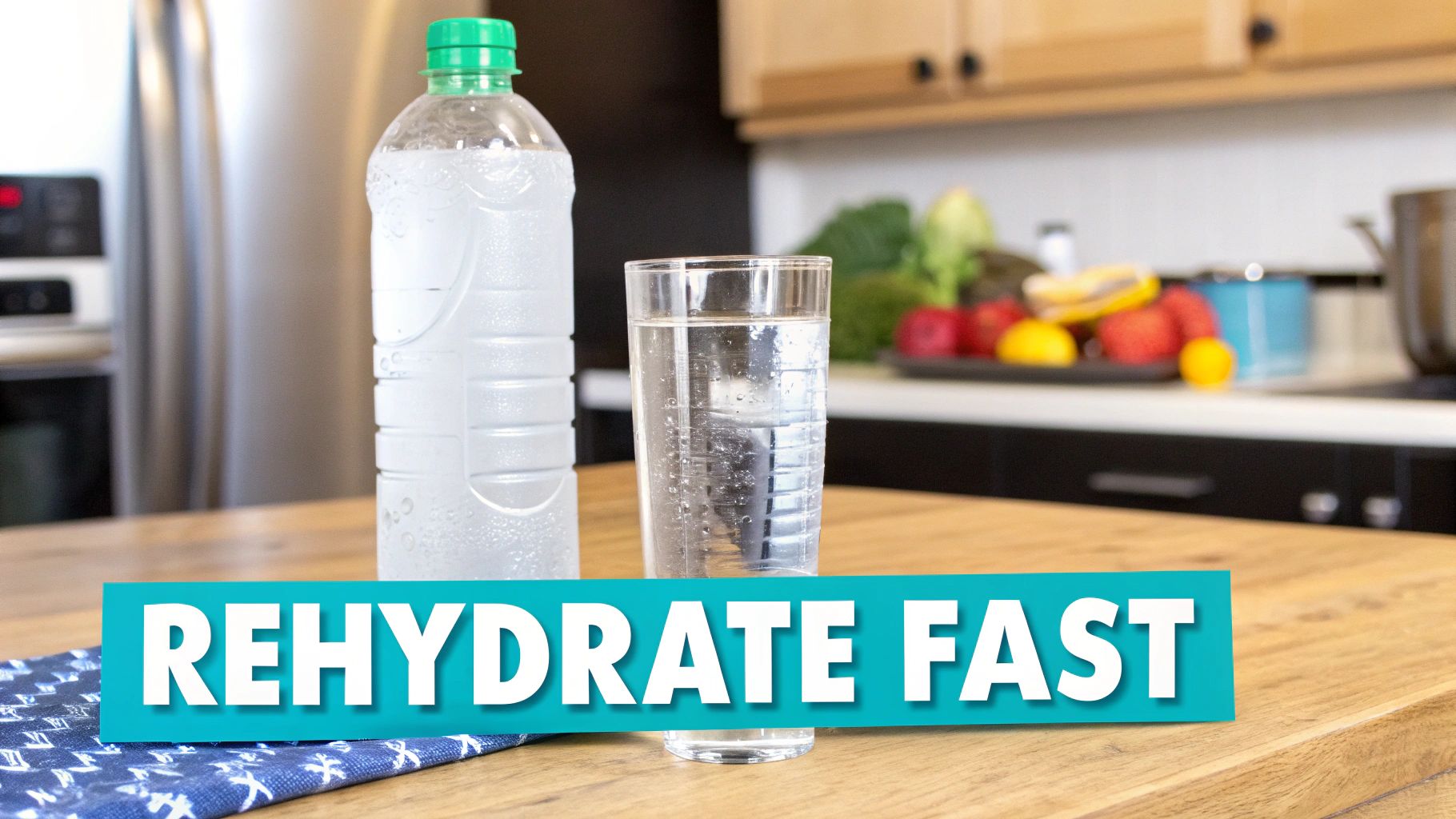
Everyone's go-to advice for a hangover is always, "drink more water." And while their hearts are in the right place, it’s only half the story if you want to cure a hangover fast. Chugging glass after glass of plain water can often just leave you feeling bloated and queasy, without actually making a dent in that headache.
The real key lies in how you rehydrate.
Alcohol is a classic diuretic, which is just a fancy way of saying it makes you pee a lot. But you're not just losing water; you're also flushing out essential electrolytes. These crucial minerals, like sodium and potassium, are the unsung heroes that keep your body running—regulating everything from nerve function to muscle contractions and, most importantly, your fluid balance.
When those electrolytes are gone, your body can’t hold onto the water you're drinking. It's like trying to fill a bucket with a hole in it.
Beyond Plain Water
To really get back on your feet, you need to replenish both fluids and electrolytes at the same time. This is where choosing the right drink makes all the difference. Think of it like trying to charge your phone with a frayed, busted cable—it might get some power in there eventually, but a proper one does the job way faster and more efficiently.
Your body is screaming for a "smart" fluid that brings back everything it lost. Options that run circles around plain H₂O include:
- Coconut Water: It’s naturally loaded with potassium, one of the main electrolytes you lose after a night out.
- Low-Sugar Sports Drinks: These are literally designed with sodium and potassium to help you rehydrate quickly. Just be careful with the high-sugar versions that can set you up for another crash.
- Simple Broth: A warm cup of chicken or vegetable broth is a game-changer. It’s soothing, easy on the stomach, and gives you both sodium and fluids.
These drinks give your cells the minerals they need to actually absorb and hold onto water, which speeds up the whole recovery process. If you want to dive deeper into the science, you can explore the best way to rehydrate after drinking for more proven tips.
Pacing Is Everything
Okay, so you've got your electrolyte drink. But remember, your stomach is probably feeling a bit fragile right now. The goal is to get hydrated without making the nausea worse. Instead of chugging a huge bottle all at once, which can totally overwhelm your system, focus on taking small, consistent sips over an hour or two.
Pro Tip: Keep your chosen drink right next to you and take a few sips every 15 minutes. It’s a gentle approach that gives your body time to absorb everything without staging a rebellion in your stomach.
This steady-drip method is the most efficient way to rehydrate and sidestep the all-too-common mistake of making yourself feel even sicker. By rehydrating smarter, not harder, you’re giving your body exactly what it needs to find its balance and get you feeling human again.
Eating Your Way Back to Feeling Good
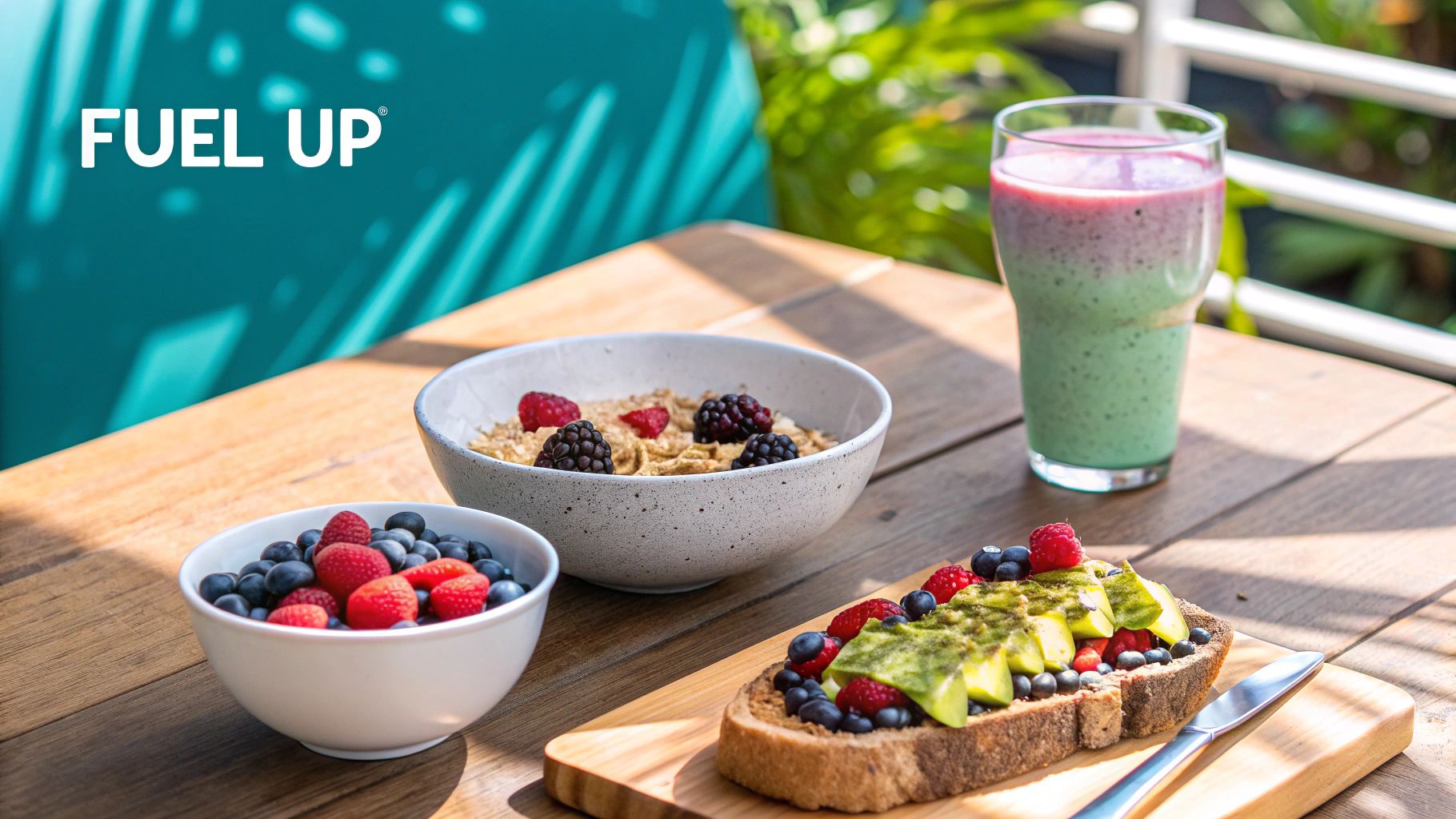
The last thing you probably want to think about right now is food. I get it. Your stomach is doing gymnastics, and the mere thought of a meal can feel like a challenge. But trust me, strategically picking what you eat is one of the most powerful moves you can make to feel human again.
A big part of why you feel so drained and cranky isn't just dehydration—it's that your blood sugar is on a wild rollercoaster. When you're drinking, your liver gets sidetracked processing alcohol instead of managing glucose, causing your blood sugar to plummet. This crash is the real culprit behind that signature hangover fatigue and brain fog. On top of that, alcohol burns through essential nutrients, especially the B vitamins your body needs for energy.
Stabilize Your System with the Right Foods
Your first meal back needs to be gentle but effective. The goal here is to raise your blood sugar slowly and steadily without upsetting your already sensitive stomach. This is where complex carbohydrates become your absolute best friend.
Unlike sugary donuts or cereals that give you a quick spike followed by an even worse crash, complex carbs provide a sustained, steady release of energy. It’s like putting a slow-burning log on a fire instead of a flimsy piece of paper.
A few solid choices to get you started:
- Oatmeal: It's easy on the stomach and loaded with complex carbs, fiber, and those B vitamins you're missing.
- Whole-Wheat Toast: A simple, bland option that can help soak up some of that churning stomach acid and deliver steady energy.
- Crackers: When you're feeling really nauseous, plain crackers are a lifesaver for getting some carbs in without rocking the boat.
Just getting a small, simple meal in can make a world of difference. You're literally refueling an empty tank.
Real-World Tip: Don't try to be a hero and force down a massive breakfast. A small bowl of oatmeal or even a single slice of toast with a bit of avocado is more than enough to start stabilizing your blood sugar and get the recovery process rolling.
Superfoods That Fight Back
Beyond just carbs, some foods are like the special forces of hangover recovery—they contain specific compounds that actively help your body fight back.
Eggs are a true hangover-fighting champion. They’re packed with an amino acid called cysteine, which helps your body break down acetaldehyde. That's the nasty, toxic byproduct of alcohol that’s directly responsible for your pounding headache and nausea. Eating eggs literally helps your body clear out the toxins faster.
Bananas are another key player. Alcohol is a diuretic, meaning it makes you pee a lot, flushing out electrolytes like potassium. Low potassium is a sneaky cause of muscle weakness, fatigue, and even cramps. A banana is one of the easiest ways to get that potassium back in your system.
And don't forget about ginger. It’s been used for centuries to calm an upset stomach. Adding a thin slice of fresh ginger to hot water or chewing on a piece of crystallized ginger can bring surprisingly fast relief from that queasy feeling. When you combine these foods, you're not just eating—you're actively repairing your body from the inside out.
Using Modern Remedies for Faster Relief
Look, we've all been there. Downing raw eggs or forcing down a bowl of oatmeal when your stomach is churning is nobody's idea of a good time. While those home remedies have their place, sometimes you need something more direct—and a lot faster—to get back on your feet.
That’s where modern hangover products come in. Think of them less as magic potions and more as a targeted, science-backed shortcut to feeling human again. They’re designed to deliver a concentrated dose of the exact ingredients your body is screaming for, especially the stuff that's hard to get from food alone when you're feeling fragile.
And it's not just a niche market anymore. The global demand for hangover cures is set to explode from USD 2.34 billion in 2024 to an estimated USD 6.18 billion by 2030. People are wising up and looking for smart, natural solutions that actually work with their body’s recovery process. You can dive deeper into the numbers and discover the full market insights on Grand View Research.
So, How Do These Things Actually Work?
The best modern remedies don't just mask symptoms; they attack the problem from multiple angles. One of the biggest game-changers you'll see is an ingredient called Dihydromyricetin (DHM). It’s a natural extract from the Japanese raisin tree, and the science behind it is pretty solid. DHM basically gives your liver a helping hand to process alcohol and its nasty byproduct, acetaldehyde, much more efficiently. Speeding that up means less time feeling miserable.
But a great product is more than just one superstar ingredient. Our Upside Hangover Jelly, for instance, is packed with a full support crew:
- Milk Thistle: This is a classic, well-known herb famous for its liver-protective qualities. It helps shield your liver from the stress of a big night out.
- Essential Vitamins: Alcohol is notorious for draining your B-vitamins and Vitamin C. Topping these back up is crucial for getting your energy back and fighting off that rundown feeling.
- Potent Antioxidants: Ingredients like Green Tea Extract go to war against the free radicals produced when your body breaks down alcohol, helping to calm inflammation.
All these components work together in one simple pack to tackle the real culprits behind your hangover: toxins, nutrient loss, and inflammation.
The Beauty of Sheer Convenience
Let’s be honest. When you're hungover, the absolute last thing you want to do is start cooking a complicated breakfast or fumbling with a bunch of different supplement bottles. This is where a product like a hangover jelly is a total lifesaver.
Key Takeaway: Modern hangover remedies give you a concentrated, science-backed dose of exactly what your body needs. They save you the hassle of sourcing multiple ingredients by putting them all in one easy-to-use format for when you're feeling your worst.
It’s a single-serve, pre-dosed packet you can toss back before you head out for the night or as soon as you wake up.
Instead of a frantic morning scramble for coconut water, bananas, and Advil, you get a powerful blend of DHM, antioxidants, and vitamins in one go. It’s a no-brainer for anyone who wants to be prepared and give their body a real head start on recovery.
Why Strategic Rest Is Non-Negotiable
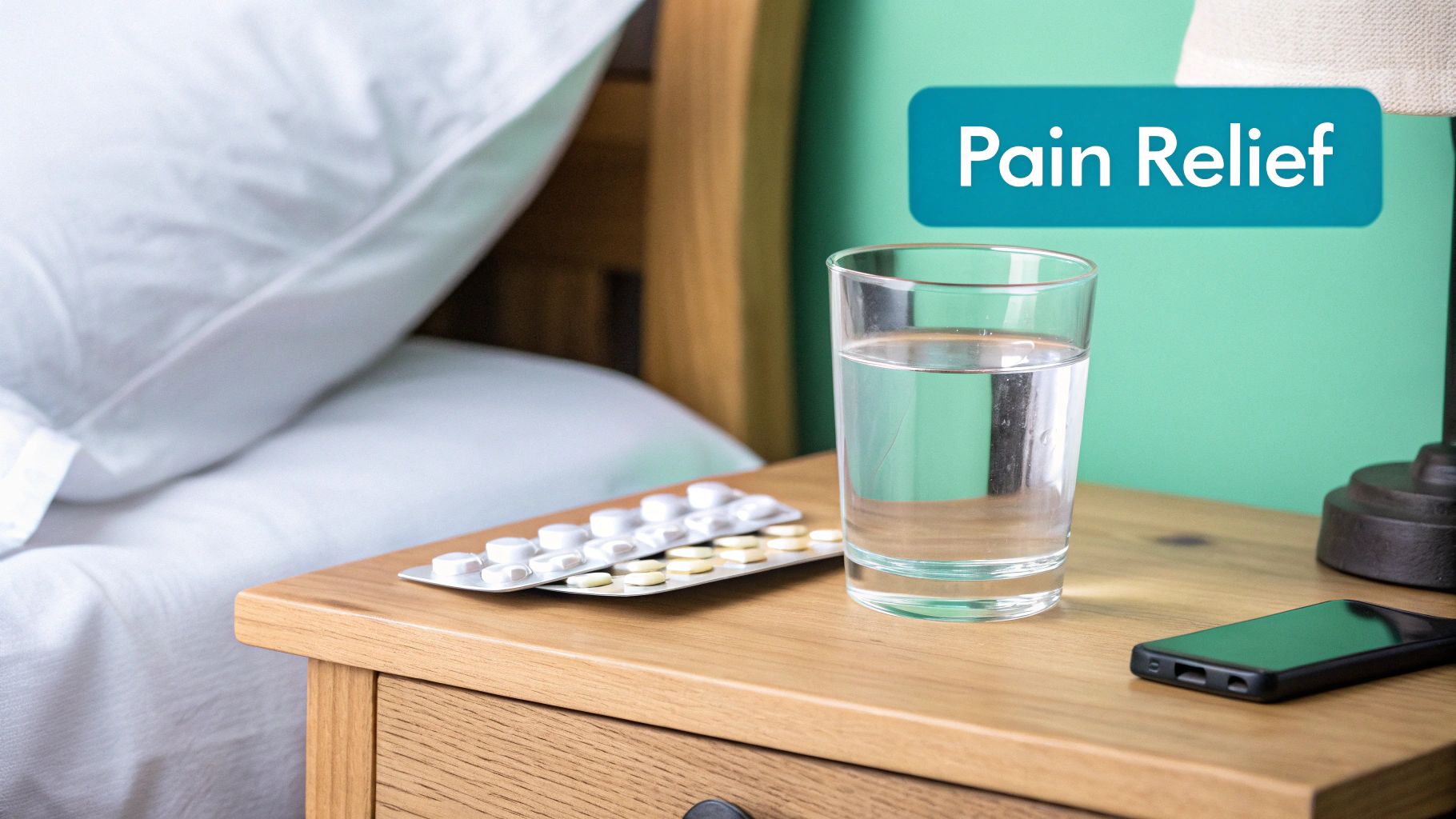
After you've focused on hydrating and grabbing some food, the final piece of the recovery puzzle is the one most people skip: rest. You just can’t cheat biology on this one. While downing water and eating smart are great first moves, your body and brain do their most important healing work when you're actually sleeping.
Thinking you can just power through with caffeine and sheer will is a recipe for a much longer, more miserable day. There's a reason people say "sleep it off"—it's not just an old saying, it's a biological command if you want to cure a hangover fast. That brain fog, crankiness, and total exhaustion? Those are loud-and-clear signals that your brain is seriously sleep-deprived.
The Problem with Drunk Sleep
You might pass out cold after a night of drinking, but that’s a world away from getting restorative sleep. In fact, it's the total opposite. Alcohol is a master saboteur of your natural sleep cycles, especially when it comes to the most important part: REM (Rapid Eye Movement) sleep.
REM is the deep-sleep stage where your brain gets down to business—repairing cells, locking in memories, and sorting through emotions. When you drink, your body's main priority is processing the alcohol, a task that actively shuts down REM sleep, particularly in the second half of the night. You might have been in bed for eight hours, but the quality of that sleep is so poor you feel just as wrecked as if you'd only gotten a couple of hours.
This is a huge reason why you feel so groggy and can't focus the next day. Giving your body a real chance to catch up on that missed REM cycle is absolutely essential for recovery.
How to Create the Ultimate Recovery Den
If you have the chance, the best thing you can do is just go back to bed. But even if you can't fall back asleep, creating a calm, restful environment helps your overstimulated nervous system finally chill out. Think of it as putting your body in low-power mode while it reboots.
To make your rest count, you need to build the perfect recovery den. Here’s how:
- Embrace Total Darkness. Light is your worst enemy right now. Pull those blackout curtains shut, find an eye mask, or just throw a t-shirt over your eyes. Light tells your brain to be alert, which is the last thing you want.
- Silence is Golden. Earplugs or a white noise app can be a real game-changer, especially if you have loud roommates or live on a busy street. It helps block out any sudden noises that could pull you out of a light doze.
- Power Down Your Phone. The blue light from your screen messes with your sleep hormones, and doomscrolling through social media will only amplify your headache and anxiety. Just put it away.
Key Takeaway: Real recovery happens when you let your body rest. Alcohol robs you of the deep, restorative sleep your brain needs, so creating a dark, quiet space is crucial for letting your system heal and clear out the mental fog.
Why You Should Never Sweat It Out
There’s this stubborn myth that you can "sweat out" a hangover with a hardcore workout. Honestly, this is one of the worst things you could possibly do.
A hangover means you’re already seriously dehydrated. Hitting the gym will just make that dehydration way worse, putting unnecessary strain on your heart and dragging out your recovery. A gentle walk outside for some fresh air can definitely help, but anything intense is completely off-limits. Trust me on this one.
The only physical activity your body needs right now is true rest. For next time, combine that with some smart planning. You can read our guide on how to avoid hangovers for tips to put into play before the night even starts.
Got Questions About Hangovers? We’ve Got Answers.
When you’re staring at the ceiling with a pounding head, you need straightforward answers, not fluff. Let's cut through the noise and tackle the big questions you have when you're desperate to feel human again.
How Long Does a Hangover Last?
Honestly, a really rough one can haunt you for a full 24 hours. But you don't have to just ride it out and suffer.
Think of it less like waiting for a storm to pass and more like actively cleaning up after it. You can seriously speed things up by getting ahead of the problem. Focus on aggressive rehydration with electrolytes, eating something solid to get your blood sugar back on track, and actually resting. Your body will thank you by bouncing back in hours, not an entire day.
Does the "Hair of the Dog" Really Work?
Ah, the age-old myth. We’ve all heard it, maybe even tried it. But drinking more alcohol the morning after is like trying to put out a fire with gasoline. It’s only going to make things worse.
Sure, that morning mimosa might give you a fleeting sense of relief, but it's just delaying the inevitable crash. You're forcing your already-overworked liver to process even more toxins and digging yourself into a deeper dehydration hole. If you're serious about feeling better fast, stick to non-alcoholic fluids and nourishing food. For a deeper dive into what's happening inside your body, you can find out exactly what causes hangovers in our detailed guide.
Key Takeaway: The "hair of the dog" is a trap. It temporarily masks the symptoms while actually prolonging your misery. True recovery is about replenishment, not adding more of the poison.
What’s the Best Thing for a Pounding Hangover Headache?
That brutal, throbbing headache is a nasty one-two punch of dehydration and inflammation. Your very first move should always be to get some fluids in you—specifically, something with electrolytes to help your body actually absorb the water.
Once you’ve started rehydrating, you can tackle the pain itself. An over-the-counter anti-inflammatory like ibuprofen can be a game-changer for calming the inflammation that’s making your head feel like a drum. It’s probably best to steer clear of acetaminophen (Tylenol), since your liver is already in overdrive clearing out last night’s decisions. Combine that with a small meal and some real rest, and you've got a powerful strategy for relief.
Can I Actually Prevent a Hangover in the First Place?
Yes, 100%. Prevention is always the best medicine, and it's way easier than trying to piece yourself back together the next day. A little planning goes a long, long way.
Here are a few pro moves to make your night out—and the morning after—much more enjoyable:
- Eat a real meal before you start drinking. We’re talking protein, healthy fats, and carbs. A full stomach slows down alcohol absorption.
- Pace yourself. It’s not a race. A good rule of thumb is to have a full glass of water for every alcoholic drink you have.
- Get ahead of the game with a modern remedy like a hangover jelly. Taking one before you drink helps prep your body to process everything more efficiently.
A little prep work means you can have your fun without dreading the sunrise.
Don't let the fear of a hangover call the shots. With Upside, you’ve got a science-backed, easy-to-take jelly stick that fits right in your pocket. Prepare your body, enjoy your night, and wake up feeling ready for the day. Try it now and see what your new morning after feels like at https://enjoyupside.com.
